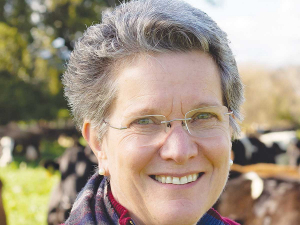Nicola Shadbolt elected as LIC director
Academic and former Fonterra director Nicola Shadbolt has been elected as LIC director.
 Nicola Shadbolt says that in the current climate, the cooperative ethos and principles resonated with consumers.
Nicola Shadbolt says that in the current climate, the cooperative ethos and principles resonated with consumers.
Agribusiness expert Professor Nicola Shadbolt says that New Zealand cooperatives have a bright future ahead of them.
Shadbolt, a professor of agribusiness and farm management at Massey University, received the Outstanding Co-operative Contribution Award at the Cooperative Business New Zealand Awards last month.
“There is scope to explore co-ops in other sectors and to continue to learn from and share how co-ops and other collective groups work best so we evolve to be stronger still,” Shadbolt told Dairy News.
She says that in the current climate, the cooperative ethos and principles resonated with consumers, but that people need to recognise that businesses were cooperatives.
“Co-ops in New Zealand need to make much more of the fact they are a cooperative, they are a collective of members.
“Collective action is critical when power imbalances exist in markets; farmers are weak sellers and weak buyers by default as our businesses are much smaller than those we transact with,” she said.
She adds that co-operatives provide farmers with an opportunity to have a more active role in the supply chain.
Shadbolt says the co-operative system is often misunderstood by some of the people who wish to change how it works.
“Remember that cooperatives are not taught in business schools of New Zealand so in the majority of cases they are an unknown construct for the accountants and business managers cooperatives employ or put on their boards.”
She says the instinct in these cases is to change the model into a corporate model, which weakens cooperatives.
Shadbolt says she wants to recognise her postgraduate students for their work in building an understanding of the cooperative business model.
“These students are the means by which the cooperative body of knowledge grows,” she said.“My hope is that the learning, and the sharing of that learning, never ends, as that is how the model will best evolve,” she said.
Fruit trader Seeka posted a record profit and returns to shareholders in 2025.
Recent weather events in the Bay of Plenty, Gisborne/Tairawhiti, and Canterbury have been declared a medium-scale adverse event.
DairyNZ's chief executive Campbell Parker says the 2024/25 dairy season reinforces the importance of the dairy sector to New Zealand.
A New Zealand agribusiness helping to turn a long-standing animal welfare and waste issue into a high-value protein stream has won the Australian dairy sector's top innovator award.
OPINION: A bumper season all around.
Dairy Women's Network (DWN) has announced that Taranaki dairy farmer Nicola Bryant will join its Trust Board as an Associate Trustee.